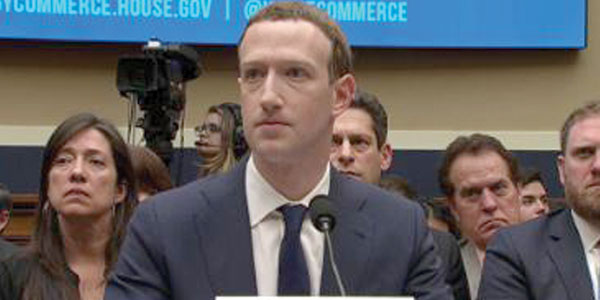
Facebook co-founder and CEO Mark Zuckerberg had the “pleasure” (and I use that word sarcastically) of going through a process that only a few powerful executives have ever experienced: a public grilling by Congress.
The grilling consisted of two days of hearings in Washington, D.C., featuring 600 questions by nearly 100 skeptical lawmakers. The hearings took place after news that the political consulting firm Cambridge Analytica had improperly harvested the private data of up to 87 million Facebook users.
Before the hearing, Zuckerberg went on an apology tour, visiting many of the lawmakers who would later grill him. Zuckerberg’s main objective was to assure them – and the United States – that he understands where Facebook failed. Another objective was to assure them that his team has outlined the work that must be done to prevent future issues of this nature.
Zuckerberg was well-prepared for the occasion. A team of experts was hired to coach him, including a former special assistant to former U.S. President George W. Bush.
Unfortunately, the members of Congress weren’t as prepared as Zuckerberg was. Many didn’t seem to understand what Facebook is or how it works. Furthermore, many weren’t even capable of following Zuckerberg’s answers.
Repeatedly, Congress asked about the company selling its users’ data to advertisers. Zuckerberg answered every time by stating that Facebook doesn’t sell data to any advertiser.
And there was this exchange: U.S. Sen. John Cornyn asked what happens to a deleted account’s data. Zuckerberg responded that Facebook deletes that data. But Cornyn continued.
“How about third parties that you have contracted with to use some of that underlying information, perhaps to target advertising for themselves?” the senator asked.
Zuckerberg was, by this point, clearly frustrated. Still, he answered the question once again.
“We do no sell data to advertisers,” he said. “We don’t sell data to anyone.”
Zuckerberg elaborated. Doing so could allow outsiders to build competitive ad-targeting products that would undermine Facebook’s business, he explained.
Clearly, American lawmakers are out of touch with today’s technology, and Facebook and other social media platforms. Lawmakers don’t have to be experts in every subject, but they should be prepared for their sessions. They have access to experts in any subject matter to help them form an educated opinion. But clearly, as the Zuckerberg hearings have shown, not many of them use that tool.
If I were to show up to a meeting as unprepared as some of those lawmakers were, I would be fired immediately. And the people meeting with me would be as frustrated as Zuckerberg obviously was when he experienced the “pleasure” of his public grilling.
El Congreso no estaba listo, pero Facebook si
Commentary by Eulogio JP
El cofundador y CEO de Facebook, Mark Zuckerberg, tuvo el “placer” (y uso esa palabra sarcásticamente) de pasar por un proceso que sólo unos pocos poderosos ejecutivos han experimentado alguna vez: un interrogatorio público por parte del Congreso.
El interrogatorio consistió en dos días de audiencias en Washington, DC, con 600 preguntas de casi 100 legisladores. Las audiencias se llevaron a cabo después de las noticias de que la consultora política Cambridge Analytica había recolectado indebidamente los datos privados de hasta 87 millones de usuarios de Facebook.
Antes de la audiencia, Zuckerberg realizó una gira de disculpas, visitando a muchos de los senadores que más tarde estarían en el recinto. El principal objetivo de Zuckerberg era asegurarles a ellos, y a los Estados Unidos, que entiende dónde falló Facebook. Otro objetivo fue asegurarles que su equipo ha delineado el trabajo que se debe hacer para evitar problemas futuros de esta naturaleza.
Zuckerberg estaba bien preparado para la ocasión. Contrató a un equipo de expertos para entrenarlo, incluyendo un ex asistente especial del ex presidente de los EE. UU. George W. Bush.
Desafortunadamente, los miembros del Congreso no estaban tan preparados como Zuckerberg. Muchos no parecían entender qué es Facebook o cómo funciona. Además, muchos ni siquiera eran capaces de seguir las respuestas de Zuckerberg.
Repetidamente, el Congreso preguntó acerca de si la compañía vende los datos de sus usuarios a otras empresas. Zuckerberg respondió siempre diciendo que Facebook no vende datos a ninguna empresa.
Hasta que llegó el siguiente intercambio: el senador de EE. UU. John Cornyn preguntó qué pasa con los datos de una cuenta eliminada. Zuckerberg respondió que Facebook elimina esos datos. Pero Cornyn continuó.
“¿Qué hay de los terceros con los que ha contratado para usar parte de esa información subyacente, tal vez para publicitar sus propios objetivos?”, Preguntó el senador.
Zuckerberg estaba, a este punto, claramente frustrado. Aún así, respondió la pregunta una vez más.
“No vendemos datos a los anunciantes”, dijo. “No vendemos datos a nadie”.
Zuckerberg elaboró. Hacerlo podría permitir a personas ajenas a la empresa crear productos competitivos de orientación publicitaria que socavarían los negocios de Facebook, explicó.
Claramente, los legisladores estadounidenses están fuera de contacto con la tecnología actual y Facebook y otras plataformas de redes sociales. Los legisladores no tienen que ser expertos en todas las materias, pero deben estar preparados para sus sesiones. Tienen acceso a expertos en cualquier materia para ayudarlos a formar una opinión educada. Pero claramente, como han demostrado las audiencias de Zuckerberg, no muchos de ellos usan esa herramienta.
Si yo asistiría a una reunión de mi trabajo tan poco preparado como lo estaban algunos de los senadores, sería despedido de inmediato. Y la gente que se reuniría conmigo estaría tan frustrada como obviamente lo estaba Zuckerberg.









